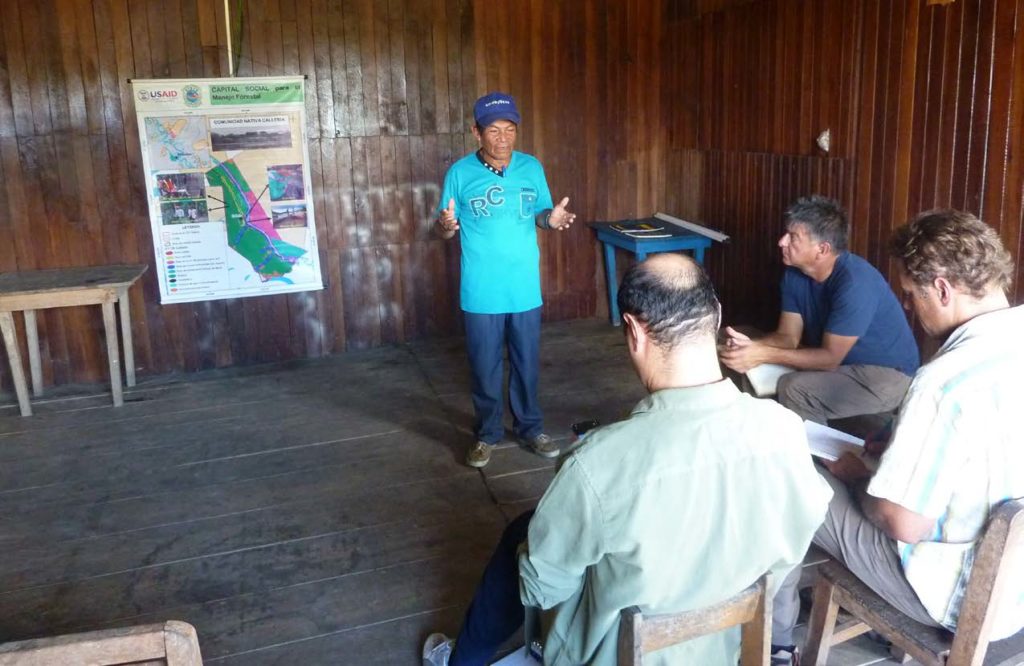Introduction
 Productive Landscapes (ProLand) has undertaken a series of field trips to validate a draft Sourcebook for United States Agency for International Development (USAID) field Missions on designing and implementing programs and activities incorporating community-based forestry enterprises (CBFEs) that emphasize timber production as an integral part of sustainable landscapes. These field visits provide information from in-country USAID officers and local practitioners as well as other knowledgeable sources.
Productive Landscapes (ProLand) has undertaken a series of field trips to validate a draft Sourcebook for United States Agency for International Development (USAID) field Missions on designing and implementing programs and activities incorporating community-based forestry enterprises (CBFEs) that emphasize timber production as an integral part of sustainable landscapes. These field visits provide information from in-country USAID officers and local practitioners as well as other knowledgeable sources.
The draft Sourcebook is based on ProLand’s “An assessment of critical enabling conditions for community-based forestry enterprises.” The assessment identified four categories of critical enabling conditions required for successful CBFEs:
- Secure rights to develop, exclude others, and sell a forest product or service are important for long-term social enterprise investment. While these rights are the most basic policy requirement, other policies contribute to a robust enabling environment.
- Governance, organization, and management that provides effective leadership and technical knowledge to the CBFE, accountability to the community, and ensures the CBFE’s financial integrity.
- A viable social enterprise model1 that produces financial benefits sufficient to reinvest in forest and business management and growth, and provides economic benefits (though not necessarily cash) to the community as a whole.
- Partnerships with value chain actors to access external funding and technical support, help aggregate timber from several communities (or individual producers), market timber to buyers, and build/maintain infrastructure. These partners include national and local government, donors, civil society organizations, and private sector entities.
The assessment included input from 18 key informants, including several from USAID field Missions. ProLand asked the latter if their Missions welcomed, and were suitable for, Sourcebook validation. Peru’s Mission Environment Officer expressed strong interest in participating on behalf of his Mission, and Peru became the third validation visit, following trips to Mexico and Indonesia.
This report documents observations during field visits to CBFEs in Peru, intended to validate and refine guidance about CBFEs. Deeper background assessment, results of other field visits, and the guidance have been published as separate documents. The Peru field trip took place from July 8–19, 2019. The ProLand team comprised Chief of Party Mark Donahue, Climate Change Mitigation and Adaptation Specialist, and CBFE lead, Ian Deshmukh, and Peruvian CBFE consultant Javier Arce. The team visited key informants in Lima, Ucayali (four communities), and Madre de Dios (three communities), according to the schedule and maps comprising Annex 1. The ProLand team was accompanied in Ucayali by David Llanos, a staff member of the Mission’s ProBosques project, and Jose Chero, a staff member of Asociacion para la Investigacion y Desarrollo Integral (AIDER), which is implementing a Global Development Alliance (GDA) activity called Alianza Forestal. Interviews followed a question guide exploring the CBFE-enabling conditions, found in Annex 2, and the ProLand team addressed other relevant issues as they arose. We wish to thank USAID/Peru for hosting the team, and all the informants, who gave freely of their time with enthusiasm.

